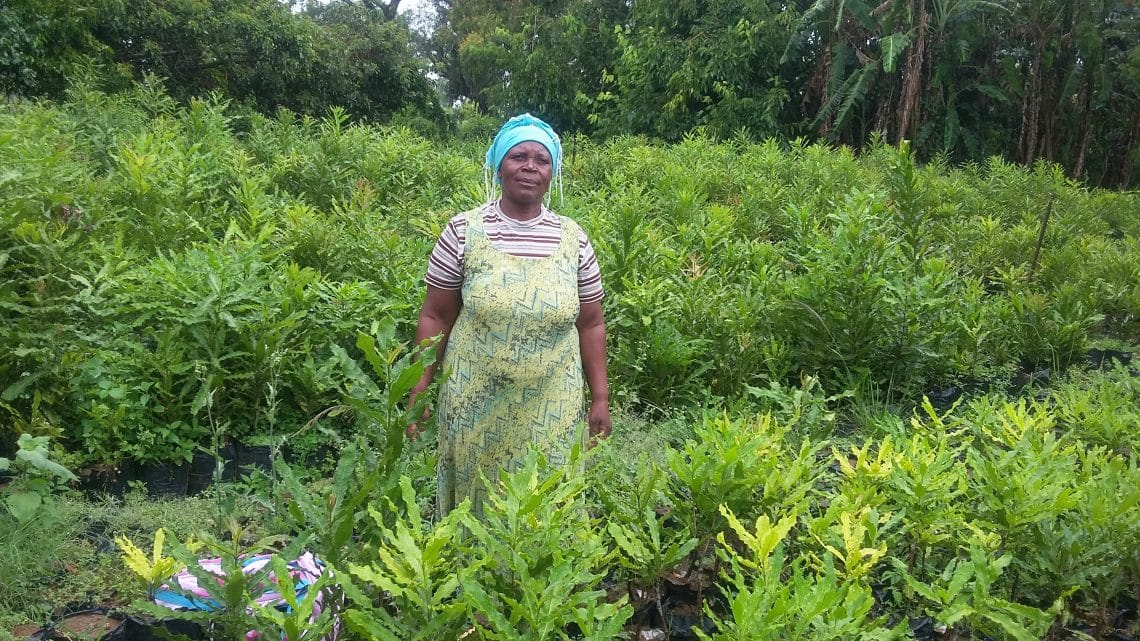Women overcome poverty through food and nutrition security programmes
By Byron Mutingwende
Ward 9 and 19 of Chipinge District are role models of successful small-scale farming under the land reform programme. The Food and Nutrition Security Committee (FNSC) initiated programmes saw women in the wards running successful banana, cassava, poultry, dairy and value addition projects.
Powered by the community-based credit and savings scheme, Gladys Sigauke, a member of the Budiriro Agriculture Club in the Hotbag A1 Resettlement area of Ward 9 in Chipinge, said the women approached farmer Samuel Mhlanga for a piece of land to implement their farming projects.
“With expertise provided by Miss Vimbainashe Munikwa, a female Agritex Officer, our group – comprising 11 women, approached Mr. Samuel Mhlanga for a piece of land. He gave us enough land where we have a nutritional garden, an apiary and nursery for macadamia trees,” Sigauke said.
For the women, the macadamia tree is the “Diamond or Million Dollar Tree.” The Budiriro nursery has about 10 000 macadamia seedlings.
“Macadamia has done wonders in uplifting our lives. Of the 10 000, we have sold 4 000 seedlings at $3 each so far. We were also taught new techniques of grafting the seedlings. We plough back the profits from the sale of macadamia seedlings to our savings club. We also run an apiary because we have many trees on the site. Some of our members are now able to send their children to expensive schools,” Sigauke said.
There is a considerable increase in growing of a variety of vegetables in both family and community nutritional gardens. Working closely with healthcare providers at health centres in the ward, the women are embracing the importance of a 4-star diet and there has been a noticeable decrease in nutritious food deficiency diseases such as kwashiorkor and stunting within the community.
The Budiriro Club is part of the Greenbelt Group that comprises 69 households running nutritional gardens. Paidamoyo Dhliwayo from the Chipinge District Food Nutrition Committee Secretariat and said to improve the capacity of women to produce sufficient and adequate nutritious food, field days and agricultural shows were done at ward level.
According to Munikwa, there are 70 beneficiaries of drip kits and 20 beneficiaries of water pumps that were provided by GIZ in the ward.
“In one of the villages within Ward 19, a greenhouse technology was established. The farmers from Budiriro, Tabudirira, Simukai and Batanai gardens were trained on farming techniques. At Emerald School in the same ward, women are making drinks from fruits like granadilla and pineapples. We also appreciate government support whereby 180 farmers were beneficiaries of the Command Agriculture programme. With training and interventions from FNSC, most households are now eating a balanced diet which consists of carbohydrates, proteins, vitamins and minerals,” Munikwa said.
Virginia Majiri and Tendai Zvoushe, the chairperson and secretary of the juice-making project at Emerald School in Ward 19 said just like guavas, granadilla grows naturally in the area.
“The granadilla fruit is now in short supply. We are buying baobab fruit to mix the powder with granadilla we harvest from the forest freely. If we buy baobab powder for $4 per bucket, we end up with $12 after sales. The juice-making project is profitable and we would want to move from using manual machines to the automatic ones to increase production,” Zvoushe said.
Rosemary Muchoko, a cassava grower in the same ward revealed that the crop that thrives in climatic regions 1 to 4 was a fast earner of hard cash. With nearly 3 ha under the cassava crop, Muchoko revealed that cuttings, about 20cm long each costs 20 cents.
“Recently, a company visited my small cassava plot and bought cassava cuttings worth $1200 in one day. Besides the cuttings, the tubers are very nutritious and said to be rich in both protein and carbohydrates. It can also be dried for future use. With the profit I made from selling the cuttings, I managed to sink a borehole at my place and also bought a huge water storage tank,” Muchoko said.
In Ward 9 of the Paidamoyo area of Chipinge, Rudo Jack, a livestock farmer, got a loan from the Agricultural Development Bank (Agribank) and got a loan of a single dairy cow. The ward has a total of 11 293 people according to the last Census statistics. Jeke learnt the expertise from Agritex officials and from her father-in-law, Noah Mlambo.
“The cow produces up to 20 litres of milk per day. It is milked twice per day – in the morning and in the evening. My in-laws have eight dairy cows. We feed the dairy cows on cabbages and mainly on Napier fodder. The Napier fodder can be kept for up to three years underground and still remains nutritious.
“Using proceeds from milk from my single cow, I managed to buy chicken, goats and turkeys. I have grown to become a successful livestock farmer. I afford to send my children to school and to feed my family from the project. My appeal is to be given more cattle since I am good at breeding them. The cow has a calf and l am looking forward to have more cows in the near future,” Jack said.
